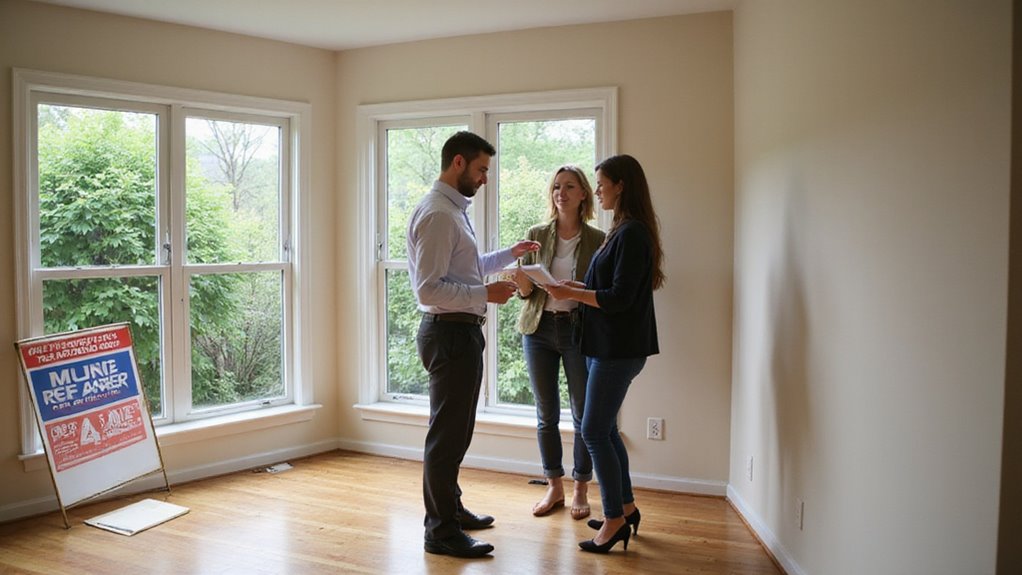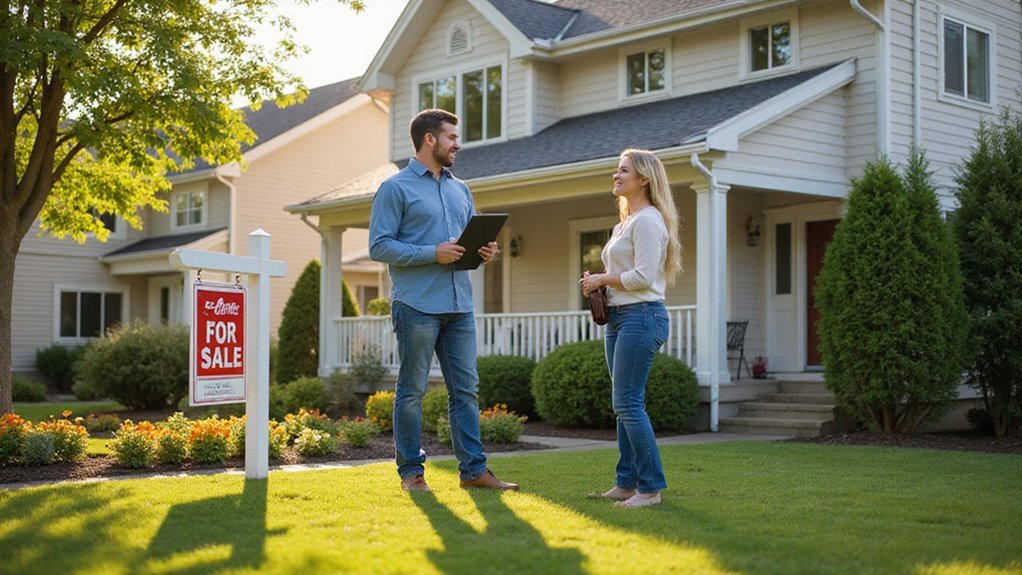When your house listing expires, it can feel discouraging and uncertain. You may wonder why your home did not sell. This setback can be frustrating, especially if you need to move soon.
The longer your home sits unsold, the more buyers may worry something is wrong. You might lose valuable time and money. Relisting without a clear plan could lead to another failed attempt.
To relist and sell a house after an expired listing, you need to review your approach and make smart changes. A fresh strategy and updated marketing can help you succeed this time. This blog will guide you through practical steps to relist and finally sell your home.
Key Takeaways
- Re-evaluate your pricing strategy using recent comparable sales and adjust to reflect current market conditions and buyer expectations.
- Enhance curb appeal and stage the home with decluttering, neutral colors, and improved lighting to make a strong first impression.
- Invest in professional photography and write a compelling listing description to showcase unique features and attract more buyers online.
- Choose an experienced real estate agent with a proven track record of selling expired listings and deep local market knowledge.
- Gather and act on feedback from previous showings to address buyer concerns and make targeted improvements before relisting.
Understanding Why Your Listing Expired

An expired listing means your home did not sell as planned. This usually happens because something in your selling plan was not right. You need to find out what went wrong before trying again.
First, check if your price matches similar homes in your area. If your price was too high, buyers may have looked elsewhere. Review recent sales to see if you should lower your price. It’s important to conduct a comparative market analysis to ensure your home is priced competitively. Compare your asking price to recent sales nearby—pricing too high can turn buyers away and keep your home unsold.
Next, look at your marketing efforts. Your listing should have clear photos and a good description. If you did not advertise widely, fewer buyers may have seen your home.
Also, think about how easy it was for buyers to schedule showings. If showings were limited, fewer people could view your home. Fixing these issues can help you succeed when you relist. Remember that market conditions can also affect your ability to sell, as timing and demand play a significant role in a successful listing.
Assessing the Local Real Estate Market
To assess the local real estate market, you need to look at current trends in your area. Check how long similar homes take to sell. Compare if the number of homes for sale is going up or down.
You should also notice if buyer interest is changing. Look for new schools, shops, or parks nearby. These can attract more people to your neighborhood. Paying attention to curb appeal can also make your home stand out to buyers in a shifting market.
Use recent sales data to understand what buyers want. If possible, talk with local real estate agents for their opinions. This information helps you price and market your home better. Examining neighborhood comps will give you a clearer picture of how your home’s value compares to others recently sold in your area.
Re-Evaluating Your Asking Price

To set a price that attracts buyers, you need to analyze market comparables, factor in any recent home improvements, and adjust for current local trends. Look closely at homes similar to yours that have actually sold, not just those still on the market. It’s also important to be aware of pressure tactics that some buyers may use to influence your pricing or decision-making, and to remain focused on fair evaluation based on real data.
By aligning your price with real data and market dynamics, you’ll boost your chances of a successful relist. If your home was previously priced too high, consider offering incentives like covering closing costs to address buyer hesitation and make your property more competitive.
Analyzing Market Comparables
Market comparables help you set the right price for your home. You should look at homes like yours that sold recently. If you ignore these facts, your price may not be realistic.
Compare homes that are similar in size, condition, and location. You must focus on final sale prices, not just list prices. If properties took a long time to sell, that could mean buyers thought they were overpriced.
Reviewing this data will show you what buyers expect. If the market is changing, you may need to adjust your price. A careful review of comparables can help you avoid another expired listing.
Assessing Home Improvements
Home updates or repairs can affect your home’s value. If you have made changes, you should include them in your new price. This helps you set a fair and competitive price.
Make a list of all upgrades, such as new kitchens or fresh paint. Estimate how much value each improvement adds to your home. This step helps you understand the total impact.
Check how your updates make your home look to buyers. Good renovations and staging can help your home stand out. If buyers like what they see, your home may sell faster.
Ask an agent or appraiser for advice. They can tell you if your price fits the current market. If you include their feedback, you can attract serious buyers.
Adjusting for Local Trends
You should always check local sales data before setting your price. Look at recent sales of similar homes in your area. If you understand local trends, you can set a price that matches buyer expectations.
Consider things like new buildings, school ratings, or nearby amenities. These details can raise or lower your home’s value. If your home has unique features, adjust your price to show that.
Use current information, not old data, to guide your decision. If you price your home based on today’s market, you attract more serious buyers. This approach will help you sell your home faster.
Enhancing Your Home’s Curb Appeal

Improving your home’s curb appeal can help attract buyers quickly. If your house looks good from the outside, more people may want to see it. Simple changes can make a strong first impression.
Start by looking at your front yard and entryway. If these areas look neat, buyers will notice. Focus on updates that show well in photos and from the street. A well-maintained exterior can help you reduce holding costs by shortening the time your home spends on the market.
You can trim bushes, add new mulch, and plant flowers for a tidy yard. If you install outdoor lights, your home becomes safer and more attractive. Power washing the siding, cleaning windows, or painting the front door can make your home look fresh.
If you update your home’s exterior, you may get more interest from buyers. Each small change can help your house stand out. These steps can make your property feel inviting. According to a University of Texas study, curb appeal can contribute up to 7 percent to your home’s value, making these upgrades especially worthwhile.
Staging Your Home for Maximum Impact
Staging your home helps buyers see its full potential. A well-staged home makes a strong first impression and attracts interest. If you want more buyers, staging is a key step. Neutral colors on walls and furniture appeal to most people. Removing personal items and clutter lets buyers imagine living there. Rearranged furniture can show off your home’s best features. Proper lighting makes rooms feel bigger and more welcoming. If a space feels dark, open the curtains or add lamps. Updated light fixtures can also make a room look modern.
Landscaping adds value to your home’s appearance. Fresh mulch and trimmed plants show care and attention. Seasonal flowers create a welcoming entrance. Even small changes can have a big impact on curb appeal, making your home stand out to potential buyers. If you stage each room thoughtfully, you do not need to spend much money. Each improvement should help buyers see the value in your home. Serious buyers are more likely to make strong offers on a well-staged home. In some cases, cash buyers simplify sales, making it easier to sell your home quickly with less hassle during the relisting process.
Investing in Professional Photography

You can’t afford to overlook professional photography if you want your relisted home to stand out online. High-quality images instantly *improve* your property’s visual appeal and make a powerful first impression. By attracting more buyers from the start, you position your listing for a faster and more successful sale.
Investing in professional photography is especially important in a fluctuating real estate market where strong visuals can help your property outshine the competition and capture buyer attention. Additionally, using professional photos can help reduce holding costs by generating more interest and potentially shortening the time your home spends on the market.
Enhancing Visual Appeal
High-quality visuals help your home stand out to buyers searching online. Good photos show your property in its best light. Clear pictures attract more interest and increase your chances of selling.
Professional photography can highlight your garden and interior design. If you invest in strong images, your listing looks more appealing. This makes your home look different from others on the market.
You should show off your outdoor spaces and keep the yard tidy. Each room should look its best with simple staging. Natural light can make both indoor and outdoor areas look brighter in photos.
These steps can help your home get more attention. Better photos may also raise the value buyers see in your property. If you follow these tips, your listing will look more inviting.
Attracting More Buyers
To attract more buyers, use professional photography for your home listing. High-quality photos show your home at its best. These images help your property stand out online.
Professional photographers know how to use lighting and angles. They make each room look bigger and more welcoming. If you want buyers to notice your home, clear and bright photos are important.
List your home when most buyers are searching. This timing gives your listing more visibility. If you combine good photos with smart timing, you may get better offers.
Do not use only phone photos for your listing. Professional photos often lead to faster and higher sales. If you want the best results, invest in quality photography.
Writing an Attention-Grabbing Listing Description
A listing stands out when the description connects with buyers and highlights special features. A clear and inviting description makes your property memorable. Use simple words to show what makes your home unique. Mention lifestyle benefits, not just the number of rooms. Show how each space fits daily needs, like entertaining friends or working from home. Buyers should see themselves living there. If you offer virtual tours, say so in your listing.
This lets buyers explore your home online before visiting in person. It can increase interest and showings. Use descriptive language to create a clear image. Phrases like “bright kitchen” or “spacious main suite” help buyers imagine the space. Always focus on what sets your property apart. Highlighting distinguishing features that set your property apart from others in the local market can help attract more attention and increase your chances of a successful sale. You may also want to emphasize the speedy transaction process that cash buyers can offer, which can appeal to buyers looking for a smooth and fast closing.
Choosing the Right Real Estate Agent

The right real estate agent is essential to selling your home after a listing expires. An agent should know how to price your home and when to list. If you choose wisely, you can avoid past mistakes.
Experienced agents understand the local market and trends. They should explain why your last listing failed and suggest improvements. If an agent cannot answer your questions clearly, consider someone else.
You should ask each agent about their track record with expired listings. Honest feedback and a clear plan are important. If you are not satisfied, keep looking until you find the right fit.
Interview several agents before making your decision. Each one should show strong market knowledge and good communication skills. The right agent will help you sell your home successfully.
You should also make sure your agent understands the legal implications of marital property if you are selling due to a divorce or inheritance, as proper documentation and disclosure can protect your interests during the sale.
Developing a Customized Marketing Plan
To relist successfully, you need a targeted marketing plan that speaks directly to your ideal buyers. Focus on identifying buyer demographics, using digital advertising for maximum reach, and showcasing your home with standout visuals. This strategic approach positions your property ahead of the competition and captures serious interest.
Identifying Target Buyer Demographics
Identifying target buyer demographics helps you market your property more effectively. The right buyer depends on your home’s features and location. Matching these with buyer needs will guide your selling process.
Start by defining the likely buyer’s age group, lifestyle, and main needs. For example, a large yard may attract families, while a condo might suit young professionals. If your home is accessible, it may appeal to older adults.
Check recent home sales in your area to spot buyer trends. See if most buyers are families, singles, or retirees. This can help you adjust your marketing plans.
Ask your real estate agent for advice about local buyers. Agents often notice shifts in who is buying and what they want. Their insights can help you focus your efforts.
Leveraging Digital Advertising Channels
Digital advertising channels help you reach more buyers when relisting your home. Platforms like Facebook, Instagram, and Google Ads allow precise targeting. These tools can show your listing to people based on location, age, and interests.
If you include virtual tours in your ads, buyers can view your home online first. This can attract people who want to see the property before visiting. Virtual tours often increase interest in your listing.
Analytics from these platforms show how ads perform. If results are low, you can adjust your budget or targeting. Paid ads provide control and clear results, unlike relying only on free posts.
Enhancing Visual Property Presentation
Enhancing your home’s visual presentation makes it more appealing to buyers. Good visuals create a strong first impression. Buyers are more likely to show interest if your property looks attractive.
Landscaping improvements can boost curb appeal if your yard looks unkempt. Trim plants and maintain the lawn for a welcoming appearance. Neat outdoor areas invite buyers to explore further.
Professional staging shows your home’s best features. Arranged furniture can help buyers picture themselves living there. If rooms feel empty or cluttered, staging can make a big difference.
High-quality photos are essential for online listings. Sharp images help your home stand out from others. If your photos are poor, buyers may overlook your property.
Leveraging Online Listing Platforms
Online listing platforms help you reach more buyers after your listing expires. These platforms let buyers find and view your home easily. If you use them well, your home will get more attention.
Online listing platforms make it easy for more buyers to find your home and boost your property’s visibility after your listing expires.
Make your property profile appealing with clear photos and virtual tours. Virtual tours let buyers explore your home from their own devices. Good visuals increase interest in your property.
If you want to reach more people, share your listing on social media channels. Platforms like Facebook and Instagram connect you to wider and targeted audiences. You can also post in neighborhood groups for local interest.
Check the analytics to see where your listing traffic comes from. If you notice certain platforms perform better, focus your efforts there. This way, you can adjust your strategy and attract serious buyers.
Hosting Effective Open Houses
An effective open house helps attract new buyers after a listing expires. It gives your home a fresh start in a busy market. Good planning and presentation are important for success.
Home staging lets visitors picture themselves living in the space. Curb appeal matters because first impressions begin outside. A clean entry and neat yard welcome guests right away.
Schedule open houses during weekends or early evenings for the best turnout. Professional signs and online posts help bring in more visitors. If the home is spotless and well-lit, buyers are more likely to show interest.
Gathering and Responding to Buyer Feedback
You need to track buyer feedback to spot recurring concerns that may have stalled your sale. Address objections directly and show buyers you’re responsive to their needs. Use this insight to make targeted improvements that boost your home’s appeal and value.
Identifying Common Buyer Concerns
Some homes stay on the market longer because buyers have specific concerns. Understanding these concerns helps sellers make better decisions. If you know what worries buyers, you can fix problems before relisting.
Common concerns include the home’s condition, price, and legal issues. Buyers may dislike outdated features or poor staging. They may also avoid homes with unclear legal status or incomplete disclosures.
If your price is too high compared to similar homes, buyers may not make offers. Honest feedback from showings helps you find problems quickly. If you address these concerns, your home will attract more interest.
Addressing Objections Effectively
Addressing objections helps improve your chances of selling. Buyer feedback gives you a clear view of what needs fixing. Use these comments to make your home more appealing.
Collect all feedback from showings and virtual tours. Look for repeated concerns about price, layout, or needed updates. If certain issues come up often, consider making changes.
Do not ignore negative comments. These point out what might stop buyers from making an offer. If you address these issues, your home will attract more interest.
Review your home staging and virtual tours. Make sure your property’s best features are easy to see. If buyers miss important details, update your presentation.
Work with your agent to respond to concerns. If buyers misunderstand something, your agent can provide clear explanations. This shows buyers you are open and willing to improve.
A proactive response builds buyer trust. If you address objections directly, buyers feel more confident in your home’s value. This can help your home sell faster.
Implementing Actionable Improvements
Turning buyer feedback into real changes is key for a successful home relist. Sellers should use feedback to make specific improvements. This step helps address main buyer concerns and increases the chance of selling.
Home upgrades should be based on what buyers mention most. If buyers point out old fixtures or floors, those should be fixed first. Targeted updates can make the home more appealing.
Pricing should be reviewed if several buyers mention it is too high. Sellers can ask their agent for advice on setting a better price. A proper price can attract more interest.
Quick changes like new paint or better landscaping can improve first impressions. Staging the home may also help. Small improvements can lead to better offers.
If sellers focus on buyer feedback, the home is more likely to sell faster and for a better price.
Negotiating Offers Successfully
Negotiating offers is important when you start getting new bids after relisting your home. You should review each offer closely and compare it to your asking price. Always check recent sales in your area for reference.
Carefully review each new offer after relisting your home and compare them to your asking price and recent local sales.
If you use clear pricing strategies, your counteroffers will be stronger. You can show buyers that you know the current market. This can help you get better deals.
You might create urgency or show flexibility with terms like closing dates. If you ask for extra details or proof of funds, you can judge buyer seriousness. If you stay alert and informed, you can avoid losing money.
A fair and confident negotiation often leads to the best results. If you follow these steps, you are more likely to secure a strong offer.
Preparing for a Smooth Closing Process
The closing process needs careful planning to avoid problems and delays. You should prepare early to make sure everything goes smoothly. Good preparation keeps the sale on track.
If you keep your home tidy and the outside neat, buyers will feel confident. You must work closely with your agent, the escrow officer, and the buyer’s team. This teamwork helps prevent misunderstandings.
You should check that all paperwork is complete and repairs are finished. If you schedule a final walkthrough, you can spot any last-minute issues. Organizing keys, warranties, and utility changes ahead of time ensures a stress-free handover. A careful, step-by-step approach makes the closing process simple and successful.
Conclusion
If your listing has expired, you still have options to achieve a successful sale. If you review what went wrong and make necessary changes, you can improve your chances next time. Careful pricing, clear presentation, and smart marketing will make a big difference.
If you need to sell quickly or want to avoid the traditional process, we buy houses for cash. We at Limitless Homes of KC can give you a fair cash offer and a fast closing. You won’t need to worry about repairs, showings, or waiting for buyers.
If you are ready to move forward, we are here to help. Contact Limitless Homes of KC today to discuss your options and get started. Let us help you turn your expired listing into a new opportunity.

